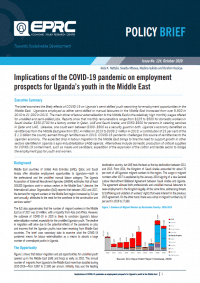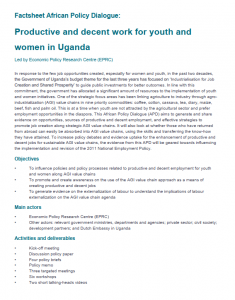
This Policy Brief shows that Uganda’s economy benefited from remittances from Ugandans who were employed in the Middle East. However, due to COVID-19 containment measures, remittances from these workers have declined and the demand for labour in the Middle East waned. Therefore, external labour markets are unlikely to offer employment opportunities for Uganda’s youth. A key policy objective to create jobs and attain long term economic development is prioritizing agro-industrialisation. For example, some wage jobs have been created in cotton value chains which have expanded and built capacity to meet the growing demand of COVID-19 medical supplies. The government of Uganda should also invest in sectors that are more resilient and are least affected by the pandemic.





